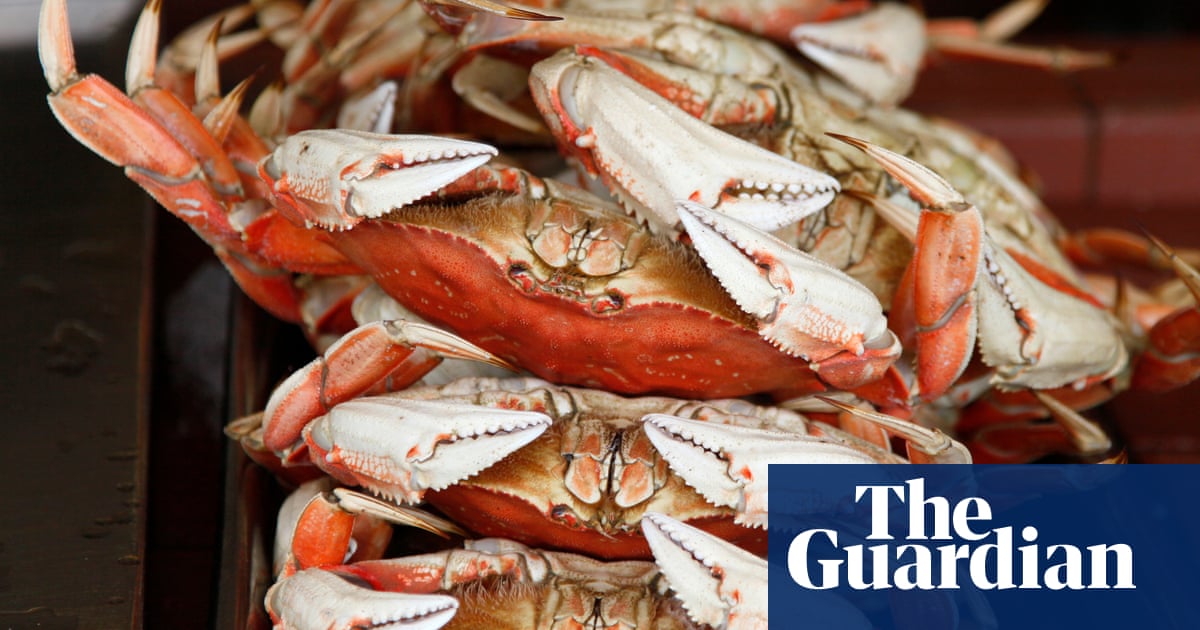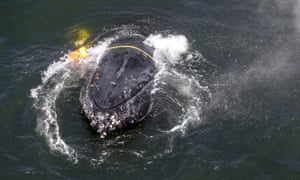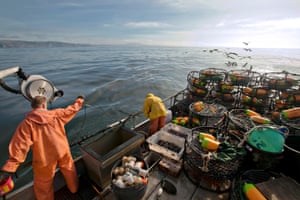Crabbers are postponing their harvest to avoid entangling whales, as the climate crisis fuels new dangers

His boat, Stacey Jo, is loaded up, crab pots stacked high, with lines and buoys coiled neatly inside cylindrical metal traps. But Tim Obert and his crew are not motoring out any time soon.
Commercial crabbers in San Francisco, Bodega Bay and Half Moon Bay have agreed to postpone the already delayed Dungeness crab harvest till 15 December, to avoid entangling endangered humpback and blue whales in their equipment.
That means that this year, the buttery, briny delicacy that is a key component of traditional Thanksgiving dinners in the area wont be available in time for the holiday.

The crabbers all came together and we decided to not mess with the whales, and that was the best moral ground to take, Obert said. But still its hard on us. This has been a tough year.
Crab season in California has been shrinking for at least half a decade because of factors related to climate change. Marine heatwaves have moved krill, the whales preferred food, closer to shore, luring more whales into the waters that crabbers have traditionally trawled. Warming oceans have also lead blooms of toxic algae that made shellfish potentially unsafe to eat, shutting down the fisheries for months in 2015 and causing delays in 2016 and 2018.
This year, the delays along Californias central coast due to the presence of whales arent the only setback for crabbers. Along the coast of northern California, Oregon and Washington, fishermen have had to push back their start date because of concerns the crabs have not grown large and meaty enough another sign that the climate crisis may have shifted the ocean food webs and left crabs without enough to eat.
To me, all of this is a case study in human institutions failing to keep up with changes in the ocean driven by climate, said Noah Oppenheim, who heads the Pacific Coast Federation of Fishermens Associations, a local industry group.
Meanwhile, as the industry faces a literal sea change, fishermen, environmental groups and state regulators have been embroiled in a number of lawsuits. Last November, crab fishermen in California and Oregon filed a lawsuit against 30 fossil fuel companies, seeking to make petroleum interests pay for the harm the climate crisis has brought upon Californias fisheries.
The suit against Chevron, ExxonMobil, BP, and 27 other companies alleges that major corporate members of the fossil fuel industry have known for nearly a half-century that unrestricted production and use of their fossil fuel products create greenhouse gas pollution that warms the planet, changes our climate, and disrupts the oceans.
Increasingly frequent ocean heat waves fueled by greenhouse gas emissions have led to the proliferation of an algae that produce a neurotoxin called domoic acid, which can build up in Dungeness crab, clams, mussels and anchovies and harm both humans and wildlife, including sea lions and birds.
Alfred Hitchcocks The Birds was probably inspired by an outbreak of domoic acid that drove local seabirds into a frenzy. Humans who eat seafood spiked with domoic acid may experience a mild stomachache or vomiting.
Still, state officials shut down fisheries when concentrations of the toxin are too high in seafood. The worst of these closures, in 2015, cost nearly $50m by one estimate and more than $117m according to another. There were shorter closures in 2016 and 2018.
This year, we havent had that come up as much, Oppenheim said. Fingers crossed.

But crab fishermen want fossil fuel companies to pay damages and help finance efforts to adapt and sustain the crab fishing industry into the future.
At the moment, the suit remains in limbo as the plaintiffs and defendants argue over whether it should be heard by state or federal court.
In the meantime, crabbers are grappling with new restrictions following another lawsuit centered around the entanglement of whales and leatherback sea turtles in crab-fishing gear. After the number of entanglements spiked from 41 in 2014 to 71 in 2016, the highest number since the government began tracking the problem in 1982, the Center for Biological Diversity (CBD), an environmental advocacy group, sued the state fish and wildlife agency for failing to protect endangered species.
In a settlement, crab fishermen agreed to end their season three months early, until the state comes up with a long-term conservation plan to minimize the risk of whale entanglements and get the funding and federal approval needed to put such a plan in place.
For now, even a single entanglement could prompt more restrictions or closures, so crabbers are looking to be extra careful. As a start, many have been tightening the lines connecting their buoys and traps, to make it easier for whales to swim around the contraptions without getting tangled.
Eventually, I hope that the industry moves towards ropeless fishing, said Kristen Monsell with the Center for Biological Diversity. California likes to hold itself up as an environmental leader and I think this provides an opportunity to live up to that image.
If fishermen can afford the ropeless equipment, and make it work, a provision of the whale entanglement settlement will allow them to cast traps in parts of the ocean that are otherwise closed to crab fishing, starting in 2021.
But thats a big if. Crabbers who have tested out ropeless gear say theyre far from practical at the moment. In 2017, Dick Ogg, a Bodega Bay crab fishermen, tested two prototypes designed so crabbers can reel in traps with an acoustic signal. One of them never surfaced, and it took Ogg about 10 minutes to find the other. Im not saying that this ropeless gear cant someday work, Ogg said. But right now, the risk that well lose our gear is too high.
Whereas regular traps and buoys cost between $250, the new systems currently cost several thousand dollars. Most crab fishermen couldnt afford to purchase them, let alone lose them, Ogg said. And moreover, lost gear can cause further harm to wildlife trapping sea life and leaching microplastics into the ocean.
As much as Id like to say, Yeah, this is the answer right here, its extremely difficult to find any one tool thatll solve the whole problem, said Ogg.
At 66, he said he was not sure if he would live to see the industry survive this latest wave of challenges.
The delays this year mean that California families wont be able to buy local Thanksgiving crab at markets and grocery stores. Recreational crabbing is still allowed, so motivated citizens can go out and catch their own, though state officials have warned people against eating the internal organs of Dungeness crab caught in certain areas due to concerns over domoic acid.
Though recreational crab boats tend to cast out fewer traps, they use the same equipment as commercial operations so whale entanglements are still a risk.
It all just kind of sucks, said Obert. But I hope that by seeing that fishermen are willing to give up Thanksgiving sales, to give up their own money at the most profitable time of year for us, in order to do the right thing and protect the whales, people will know that were really committed to doing right by the environment.
The 33-year-old captain, who has been working on a crab boat since he was 13, said he was not willing to give up on crabbing all together. I guess you could say I have more of a millennial outlook, he said. Im looking to find ways to change and adapt the industry.
Obert has been taking courses on fishery management and climate change. This is a dangerous job, its a stressful job, he said. But for me, the ocean is still my calm place. And this is my passion.


Recent Comments